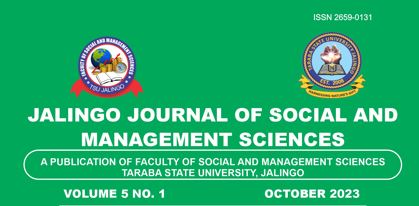Social Investment Policy of the Buhari Administration and Poverty Alleviation in Nigeria: An Assessment of the Homegrown School Feeding Programme in Taraba State
Keywords:
Social Investment, Poverty, Homegrown, School Feeding ProgrammeAbstract
The National Home Grown School Feeding Programme is a component of the National Social Investment Programme initiated by the Federal Government of Nigeria in 2016. The objective of the programme is to promote primary education while reducing the scourge of poverty among the beneficiary communities through the promotion of local agricultural production, creating employment and stimulating economic activities in the beneficiary communities. Communities, especially the local farmers, local traders, and local caterers, are through this programme, expected to derive some benefits. The study was anchored on the HGSF Theory of Change by Sumberg and Sabates-wheeler, (2010). Mixed methods of research were adopted for the purpose of data collection and analysis. Primary data were collected using interviews. It was revealed that in spite of the over five years of the implementation of the HGSFP, poverty remains a persistent feature in Taraba State. The National Home-Grown School Feeding Programme has not made significant contribution in reducing poverty among the beneficiaries in Taraba State. There is improvement among caterers and aggregators who benefited from the programme. The agricultural products used in feeding the pupils are largely imported from outside the beneficiary communities. The study recommends that the Federal and State governments should review the food procurement strategy to enable the caterers to purchase the food items directly from local farmers, government should change the policy from the presidential intervention to a statutory agency by ensuring that Social Investment Bill (2022) is passed into law in order to ensure the sustainability of the programme so that caterers, traders and farmers, who are the target (beneficiary communities) benefit substantially from the programme.

Downloads
Published
Issue
Section
License
Copyright (c) 2023 JALINGO JOURNAL OF SOCIAL AND MANAGEMENT SCIENCES

This work is licensed under a Creative Commons Attribution-NonCommercial 4.0 International License.
